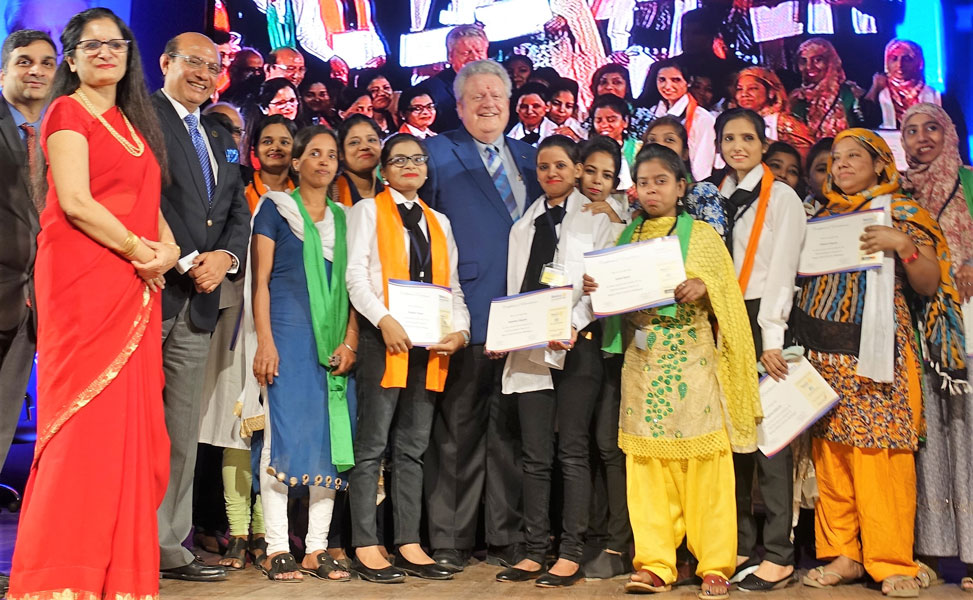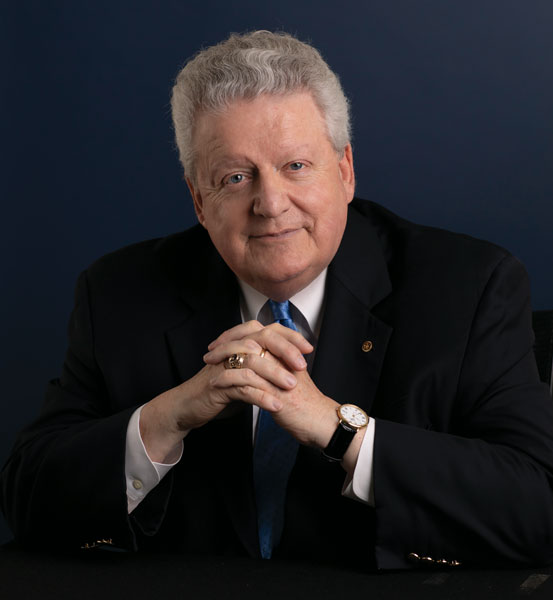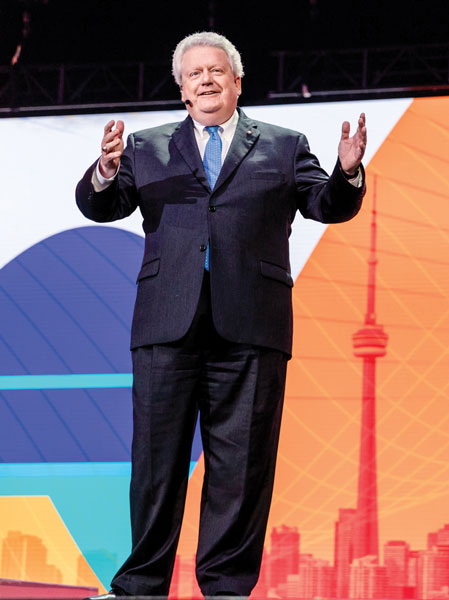RIPE Maloney maps out a course for Rotary’s future
Mark Daniel Maloney knew the routine. For, he had served as chair of the committee that nominated Sam Owori as Rotary International President for 2018–19. In the summer of 2017, Maloney was one of six candidates who had travelled to RI headquarters seeking that nomination for 2019–20.
“I was interviewed before lunch, so I knew I had a few hours before the committee made a decision,” recalls Maloney. “It was a lovely August day, and I went for a long walk through the beautiful neighbourhoods of Evanston. I had a late lunch, and then I came back to my hotel room and waited.”
Given what had happened in years past, Maloney expected to hear from the committee by late afternoon, but with evening coming on, there was still no word. “I was texting to my wife, Gay, ‘Haven’t heard anything yet,’ and then the phone started ringing. It was Anne Matthews, the chair of the nominating committee, and she asked me to return to the building.”
Rotary is all about connection. When you join a club, you connect with the business leaders in your community. Rotary connects you and clubs and districts for service around the world.
This was an unexpected twist. In years past, candidates received a phone call telling them if they had been chosen. Anticipating that would happen again, Maloney had shed his suit and tie and was wearing khakis and a Rotary logo shirt. Now he had been summoned back to RI headquarters.
“I was bumfuzzled,” he says. “I was not expecting that. I didn’t want to keep anyone waiting, so I didn’t even put on a sports jacket. I’m on the phone with Gay saying, ‘I’m heading into the building. I think this is it.’ ”
In the lobby, Andrew McDonald, RI’s deputy general counsel, greeted Maloney and escorted him to the 18th floor boardroom, where the nominating committee waited. Matthews rose. “As I recall, she said, ‘Ladies and gentlemen, may I present Mark Maloney, the nominee for president 2019–20.’ So that was pretty exciting.”
Fourteen months have passed. It’s a fine October morning, and Maloney sits in the president-elect’s office, an 18th floor aerie overlooking Lake Michigan, talking with The Rotarian editor-in-chief John Rezek and senior editor Geoffrey Johnson. For the next 90 minutes (and for another hour a week later), they discuss Maloney’s aspirations for his presidency.
A lawyer — he and his wife are partners in the Decatur, Alabama, law firm founded by Gay’s father — Maloney speaks in thoughtful, well-formed sentences and long, carefully constructed paragraphs as he charts out his hopes for Rotary’s future growth (His rich baritone also does creditable double duty when he breaks into song, a booming chorus of “R-O-T-A-R-Y / That spells Rotary”).
Like the good lawyer he is, Maloney immediately steers the line of questioning into a direction of his own choosing.
The Rotarian: Let’s start at the end. What do you want your presidential legacy to be?
Maloney: Let’s not start at the end. Let me give you a preliminary response, and then I’ll answer your question.
Rotary is like a United Nations of individuals. The United Nations is an international organisation of countries; Rotary is an international organisation of individuals. We are having a tremendous impact in the world. Just within the past month I’ve had some experiences that brought that home to me. Two weeks ago, Gay and I joined with Rotarians from our two Rotary clubs — my Rotary Club of Decatur and her Rotary Club of Decatur Daybreak — in a water filter distribution project on St Thomas in the US Virgin Islands. Our partner club, the Rotary Club of St Thomas East, hosted a dinner meeting during which a panel of local experts addressed water issues on the island following the hurricanes that happened in 2017. Toward the end of the meeting, a Rotarian got up and said: “When I listen to the news or read the newspapers, I can become despondent. But when I come to a meeting like this, Rotary makes me realise that the world has a great future.” Rotary’s work completely changed this individual’s attitude about where the world is going.
We need new clubs with alternative experiences that meet in nontraditional ways. That would help us attract a different demographic.
And this weekend here in Evanston, we inducted 32 individuals and couples into the Arch Klumph Society. These were Rotarians who had contributed substantial sums of money to support polio eradication, peace and conflict resolution and prevention, maternal and child health, and other causes. And there were so many stirring stories about what these Rotarians see Rotary accomplishing in the world today, so much so that they want, to use a colloquialism, to put their money where their mouths are. So that’s the Rotary that I want to facilitate, that I want to make happen.
So now that I’ve laid that predicate, I’ll answer your question. At the end of my term, I want to have inspired changes in our Rotary culture that make it possible for Rotary to continue doing the things that heartened the soul of that Rotarian in St Thomas and that inspired those Rotarians at the Arch Klumph ceremony to make those significant contributions to The Rotary Foundation to keep that work going.
TR: How do you ensure that happens?
Maloney: We need to grow Rotary. We need more hands doing service, more brains coming up with ideas. We need more partnerships, more connections. To accomplish that, I have four priorities for my presidency, and No 1 is growing Rotary.

TR: How do you do that?
Maloney: First, we redouble our efforts to support our clubs to attract new members and engage current members so that they stay with Rotary to perform greater and more innovative service. That means clubs being more flexible than they have been.
But the other aspect is to form new Rotary clubs. Our tradition was to form new clubs in areas where clubs didn’t exist. We need now to focus on forming new clubs where Rotary not only exists, but thrives. In many of those areas, we are serving only a certain segment of the population. We need new clubs with alternative experiences that meet in nontraditional ways. That would help us attract a different demographic — be it age, gender, ethnic background — so that we are serving all aspects of the community.
TR: What are your other priorities?
Maloney: My second and third priorities support the first. At every level of this organisation we need to design our club meetings, service projects and social events so that they are family-friendly. We need to provide opportunities that complement younger individuals’ family lives rather than compete with those family lives.
And my third priority is that we must change our culture, our attitudes, and the way we do business so that it is possible and apparent that you can be actively engaged in Rotary and even assume positions of Rotary leadership while you are still actively engaged in your business or profession. If we want Rotary to be attractive to a younger demographic, we have to make Rotary leadership accessible to the younger demographic.
TR: What’s No 4?
Maloney: In June 2020, the United Nations will celebrate the 75th anniversary of the signing of the UN Charter. Rotary has been involved with the UN even before it began. Because of that, I want to focus on Rotary’s relationship with the United Nations. The annual Rotary-UN Day will be returning to the UN headquarters in New York after having been in Geneva and Nairobi. We also hope to have three presidential conferences focusing on Rotary’s relationship with specific UN agencies at different locations around the world and a final celebration of Rotary’s UN relationship before the convention opens in Honolulu, Hawaii.
So in terms of legacy — just to wrap that up — for those of us who are working together in 2019–20, our success will not be measured on June 30
of 2020, but on June 30 of 2025 or 2030, when others can determine whether the things we started had an impact as the years went by.
TR: When will there be a female president of Rotary?
Maloney: I think it will be in the next five years. The structure of Rotary is such that to be district governor, you must have served as club president. To be an international director, you must have been a district governor. And to be RI president you must have been an international director. Women have worked their way up through those ranks, and we have now several past directors who are women. They are gaining experience in other positions as well, and that makes it ever more likely every year that a woman will be nominated.
I am certainly conscious of promoting gender diversity in Rotary. I’ve chosen a woman to chair my convention committee and nominated another to serve as a trustee of The Rotary Foundation. And next year we will have two women on the Board of Directors, and the following year we’ll have five.
My father-in-law, Gilmer Blackburn, told Gay and me 15 or 20 years ago that if peace is going to come to the world, it’s going to be through Rotary.
TR: Explain how you came up with your presidential theme — and was it more difficult than choosing your presidential tie?
Maloney: Oh, no, it was far easier than choosing the tie.
TR: So tell us about your theme: Rotary Connects the World.
Maloney: Rotary is all about connection. When you join a club, you connect with the business leaders in your community. Rotary connects you and clubs and districts for service around the world. The whole basis of The Rotary Foundation is to connect Rotary clubs in one part of the world with Rotary clubs in another part of the world, typically Rotary clubs from a developed country with Rotary clubs in a developing country to undertake a humanitarian service project.
Rotary connects the world on a less formal basis internationally. Rotary International conventions and other international meetings are wonderful events. You see people there year after year that you don’t see at any other time of the year, and you connect with them through friendship. You’ve seen the promo: “Rotary, the original social network”. That’s true.
TR: Rotary’s efforts toward peace: reasonable aspiration or exercise in head-banging futility?
Maloney: It’s a reasonable aspiration. My father-in-law, Gilmer Blackburn, told Gay and me 15 or 20 years ago that if peace is going to come to the world, he’s convinced that it’s going to be through Rotary. We have the opportunity to have an impact towards a more peaceful world. Do we have the opportunity to create the Pax Romana that existed at the time of the birth of Christ? No, but we do have the ability to contribute to peace, to put leaders out there through our Peace Fellows programme who may help lead to some version of the Pax Romana.
TR: Why did you join Rotary at age 25?
Maloney: I joined Rotary because it was the thing to do. I was a new attorney coming into Decatur, and it seemed as if that’s what all young professionals did: join a civic club.
TR: But why Rotary?
Maloney: I joined Rotary because my father-in-law was in Kiwanis. In terms of networking and making connections, the law firm already had a representative there; we ought to have a representative in the Rotary club. It turned out to have been a terrific decision.
TR: Why is that? What kept you in Rotary all these years?
Maloney: One, because of the connections — because of the friendships in the local club, and then the friendships in the district, the friendships internationally.
Two, because I was engaged in Rotary from the beginning. Gay and I have always been organisers. I belonged to 4-H, and I was the president of the county 4-H federation in my early teenage years. I was a state officer for the National Beta Club. I was the president of the Catholic Youth Organisation for the Roman Catholic diocese of Belleville, Illinois, and at Harvard I was a football manager. I didn’t just join things. I organised things, and I moved up in those organisations.
So I was engaged in my Rotary club immediately. I joined in December 1980. About a year later, they put me on the programme committee, and a year later I was the committee chair. It may have been three years after that, that I got on the board. The precise timing is lost in the mists of time. Either way, I can’t imagine a life without Rotary.
© The Rotarian


